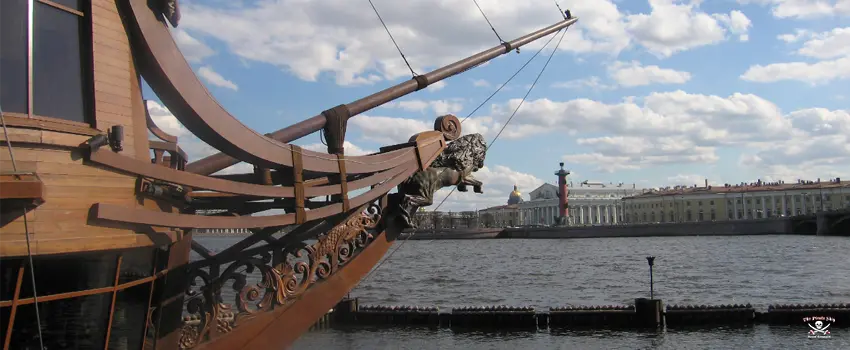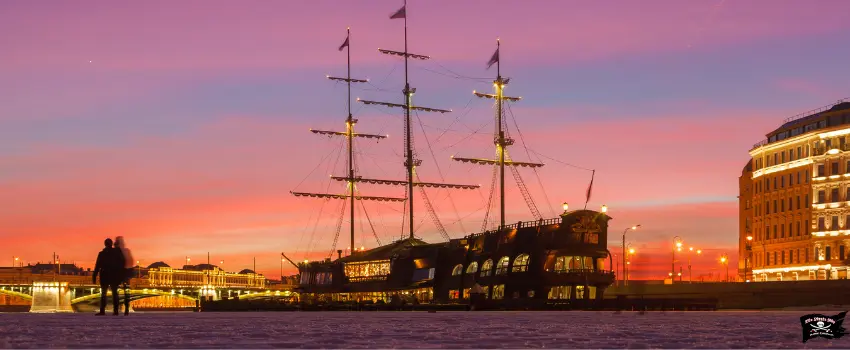Gather ’round, though it be nearing summertime, ’tis the season for a proper ghost story. Tales of swashbuckling pirate adventures are replete with myths, but none surpass the legend of The Flying Dutchman. Ripe with ghosts, cursed ships, and larger-than-life personalities, this tale checks all the boxes for a classic story to tell around the campfire—or on board a pirate’s galleon. Is The Flying Dutchman real?
Laying your eyes upon The Flying Dutchman can spell doom for a ship. Some say the long dead crew themselves will attempt to send messages to relatives from the distant past, should you happen to get close enough to talk to them. In any case, seeing its ghostly visage is never a good omen. Perhaps the truth of the matter can be found in history itself.
Origins of The Flying Dutchman
According to legend, The Flying Dutchman operated as a real vessel during the height of the Dutch East India Company’s dominance over global trade. Before becoming a ship of nightmares, it was a merchant ship that sailed between the Netherlands and the East Indies. It carried goods and supplies to the Dutch colonies in the region.
The most commonly cited source for the origin story was published in 1790. In
“Travels in Various Parts of Europe, Asia, and Africa During a Series of Thirty Years and Upwards” by John MacGregor, the author claimed that the story was based on actual events he had witnessed firsthand. However, this claim has been called into question by some scholars.
Based on consensus, The Flying Dutchman ship is believed to have been a fluyt, a type of cargo vessel designed for speed and carrying capacity. However, as the story goes, it was lost at sea during a rather vicious storm. How that came to be depends on the source.
A popular version suggests that the captain of The Flying Dutchman made a fateful decision to sail through the Cape of Good Hope. He made this decision despite warnings from his crew that it was too dangerous.
The Flying Dutchman ship was battered by a ferocious storm, and the crew begged him to turn back. But he was determined to complete his mission, and he swore an oath that he would never turn back, even if it meant sailing the ship to the ends of the earth.
As the storm raged on, the crew grew more and more terrified. They began to believe that they were cursed, and that the ship would never make it to its destination. Finding no safe harbor, The Flying Dutchman was lost to the seas that night. From its disappearance, however, a truly spooky tale was born: the Flying Dutchman ghost ship.
The legend goes that the ship was doomed to sail the seas forever, never able to make port or rest. The crew were said to have been cursed to man the ship for all eternity, their souls trapped on board as punishment for their captain’s arrogance.
Weary sailors report having seen the ship on particularly gloomy days at sea, its cursed bow a terrifying sight through fog and rain. Sadly, as cool as it may seem to spot a ghost ship, seeing it spelled doom for weary sailors.
The Flying Dutchman in Popular Culture
Of course, a tale as outrageous as The Flying Dutchman’s would cause countless iterations throughout pop culture. The ghost ship has been adapted and re-imagined in a variety of ways.
One of the most famous adaptations of the legend is Richard Wagner’s opera, “The Flying Dutchman.” The opera tells the story of a sailor named Daland who encounters the ghostly ship and its cursed crew. In the opera, the Flying Dutchman is searching for redemption and release from the curse that has trapped him for centuries.
The legend of The Flying Dutchman has been the inspiration for numerous works of fiction. Perhaps the most famous of these is Samuel Taylor Coleridge’s poem “The Rime of the Ancient Mariner.”
It tells the story of a sailor who shoots an albatross and is then cursed to wander the earth, telling his story to anyone who will listen. The parallels of committing some form of grievance and seeking forgiveness and resolution are shared between the poem and the legend.
The Flying Dutchman has also made appearances in numerous films and television shows. In the popular Disney franchise, Pirates of the Caribbean, the Flying Dutchman is captained by the fearsome Davy Jones, who is himself cursed to serve as the ship’s captain for all eternity.
Its presence is not limited to films or television, however. In the third installment of the popular video game franchise Kingdom Hearts, the Flying Dutchman makes an appearance as a boss stage and features the dreadful kraken.
The Flying Dutchman has come to represent the idea of being cursed or doomed to wander forever as punishment for crimes or sins. With that in mind, it’s easy to spot analogies to the cursed vessel in many seemingly unrelated tales.
The Real Story Behind the Legend
In the 17th century, the Dutch East India Company was one of the most powerful trading companies in the world. Its ships regularly sailed to the East Indies, carrying valuable cargoes of spices, textiles, and other goods.
These voyages were often long and dangerous, and many ships were lost to storms or piracy. A ship like The Flying Dutchman would have made for a cherished asset. Instead, it became the symbol of bad luck for sailors even to this day.
The Flying Dutchman story is one of tragedy. While its true origins may be lost to time, the ship lives on aboard the Royal Conquest, the most thrilling pirate cruise in Madeira Beach.










